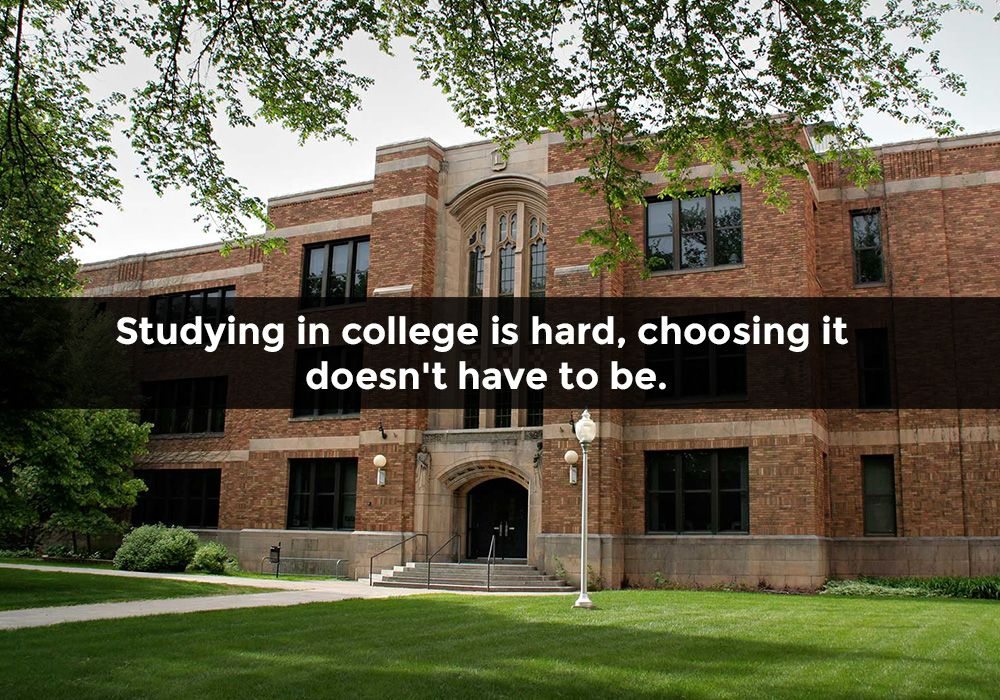The Ultimate Guide To Choosing the Right College For You
Graduating high school and going to college or university at any point in life is one of the most exciting times. You are getting ready to pursue something you love and embark on a new chapter in your life.
Even though it is an exciting time, the whole process of choosing a college or university can be tricky and often stressful for many prospective students. It becomes much harder when you are looking for colleges abroad.
When you have gotten several acceptance letters and aren’t sure which college is best for you, we are here to help. Keep reading to learn everything there is to know about choosing the right college for you, including why it is important, the things you need to consider, and important tips you can use in the process.
Why Choosing the Right College For You Is Important
Depending on what you want to do with your life, you will want to choose a college or university with the program you want.
If you don’t know what you want to do, you don’t want to pick one that doesn’t have ample degree options.
Another reason to be keen on what college you choose is that you will spend anywhere from two to four years at this place. You must be happy with your college of choice, or you won’t be as committed to your classes and program.
You want to choose a school that fits what you want, including class types, campus size, campus organizations, etc. When you don’t select one that will suit you, you’re more likely to be unhappy and even end up dropping out or trying to switch schools at some point.
Taking the time to choose the right college for you will be more beneficial in the long run.
Things To Consider When Choosing the Right College For you
So, if you are wondering how to pick a college, these are some of the most important things to consider.

Location of the College
The college’s location is a huge consideration when choosing the right one. You will want to think about the countries you would want to go to school in and where they are in relation to your home country. Also, you need to consider what other countries you want to travel to during your time in school.
Do you want to be at a university that’s in the city? Or do you prefer something more on the outskirts? The location is vital to your overall happiness. If you hate being in the city, you will likely not enjoy attending school in a major city, especially abroad.
Another thing to think about location-wise when choosing a university abroad is access to public transportation. Since you won’t be bringing a car, you will need a way to get around. Choosing a college with public transportation nearby will make your college experience far easier.
The College’s Size
Colleges and universities come in all different sizes. Going to a larger school can be very overwhelming for young students. While many prefer to attend a large college, it’s not for everyone.
If you’d be happier at a small school, you will want to research colleges abroad with far less student body than others. What you consider small and what someone else finds small might vary, so it is essential to research yourself to see what you are comfortable with.
Larger schools can be great for people who want to break away from a small-town vibe and feel like they live in a city within a city. Smaller schools are perfect for people who prefer a more tight-knit group.
Even with smaller schools, you won’t know every single person. This will allow you to feel still like you are at school, making navigating the campus far easier since there’s less ground to cover.
College Diversity
During your college search, assessing a diverse student body is worth considering. A school with a diverse student body has a great campus culture. When there is an excellent campus culture, it leads to happier students, better test scores, and a higher graduation rate.
Private or Public Universities/Colleges
You will need to consider whether you want to attend a private or public university. There are not many main differences between the two that you will see at first glance, but there are differences. Public colleges rely on government funds, while private colleges rely on endowments and tuition. That’s why private schools are far more expensive than a public university.
Besides that, you probably won’t feel a huge difference between the two types. When choosing a school abroad, you will want to look into each country’s definition of public and private universities to understand better how higher education works in that specific country.
Online Classes or In-Person Classes
In our day and age of technology, many people can take courses online or partially online. If you want to attend virtual classes, consider the colleges that offer online courses.
There are some completely online colleges, but most will offer in-person courses. Some people enjoy having a combination of online and in-person classes. As you think about the schools you might want to attend, check what classes they offer.
Something to remember is that while some colleges will offer online courses, they only do so for specific degree programs. You should check this against the degrees you’re considering pursuing if you want the ability to take online classes at some point during your pursuit of higher education.
Degree Programs
Thinking about what degree you want to pursue is vital when it comes to picking a college. You will need to decide if you want a bachelor’s degree, which is the most common, an associate’s or even a certificate.
If you know what career path you want to take, you will want to ensure that the colleges you are looking into abroad offer those degree programs.
In addition to offering a degree program in what you want, you’ll consider if it’s transferable to your home country if you were to move back after graduating. Transferring credits is vital for many people attending school abroad.
For example, you know you want to study marine biology. In that case, you don’t want to waste your time looking at colleges that don’t offer a degree in marine biology or something similar that you’re interested in.
Not everyone researches colleges knowing precisely what they want to do with their life. Going to college is all about learning more about yourself, so if you don’t know what you want to study yet, choosing a school that has a wide array of degree programs and courses you can take can help you figure out what to choose and not limit you.
Accreditations
As you research colleges abroad, you will want to think about their accreditations. Accreditation is when a college or university undergoes an evaluation and is recognized as meeting a particular set of standards around excellence and quality. Going to school at an accredited university is more impressive than going to one that’s not accredited.
These schools have a proven record of high-quality staff, courses, degree programs, a great campus environment, and more. There are different types of accreditations in the United States, but they’re a little different abroad and from each country.
The best thing to do while you’re thinking about schools to attend abroad is to look at their website and see if they have any accreditation and for what programs or if it’s for the entire school.
Campus Organizations
One of the best things about going to college is the option to join various campus organizations. Yes, the degree program you choose and your classes are important, but a full college experience wouldn’t be the same without joining at least one campus organization.
If you are interested in joining Greek life, you should ensure that the schools you’re interested in have IFC, Panhellenic, National Pan-Hellenic Council (NPHC), etc. Greek organizations.
Greek organizations aren’t the only options on college campuses. There are medical fraternities, engineering organizations, volunteer clubs, and almost any type of organization you can think of that you can join.
The thing about this is not all colleges offer the exact same organizations. Many do, but not all of them. You must spare time to review the colleges you are interested in and see what student organizations they offer and if they appeal to you.
Most colleges and universities will have a page on their website listing the various organizations available to their students. Many of the organizations have requirements to join and stay in, which can encourage students to keep their GPA up, allow them to meet new friends, and have fun.
The Cost
You will want to think about schools that you can afford in some capacity. Whether you want to use loans, grants, scholarships, pay out of pocket, or a combination of the four, knowing the cost can be beneficial in making your decision. Furthermore, there is no need to choose a college that you are sure you cannot afford since you will need to cut your studies short after a while.
When looking at colleges and universities, some are more affordable than others. For example, colleges and universities tend to offer lower tuition rates for residents of the state that the campus is in.
So, those colleges that are out of state will be more expensive than the ones located in the country in many situations. Also, public colleges are far more affordable than private schools no matter the state.
Languages the Classes Are Taught In
When choosing a school abroad, you must consider what languages they teach their courses in. If you can’t understand the language they are teaching in, then you won’t get the most out of your learning experience.
Many schools abroad teach classes in English and their country’s primary language. Double-check and consider the language barrier when choosing a school abroad.
Tips For Choosing a College
Knowing the main things to consider when choosing a college or university is only half the battle. We’ve rounded up some of the best tips to help you choose the right college considering the above considerations.

Do Thorough Research
There’s more to choosing the best college than looking it up online and seeing campus pictures. You’ll need to thoroughly research and learn all the facts necessary to make an educated decision that best suits your needs and goals.
Thorough research includes scouring the website for degree programs, cost, campus organizations, dining hall options, dorms, and more. A complete picture of what going to school at specific colleges will be constructive when deciding.
While most colleges and universities have similarities no matter where they are abroad, learning more about schools in the countries you’re interested in studying is crucial since you’re not currently living in the country they’re in.
Consider Your Financial Situation
The last thing you want to do is get your heart set on a specific campus but not be able to afford it, even with financial aid packages. Regardless of your financial situation, you can look into any scholarships, grants, and loans you qualify for to assist you in paying for your education.
When considering how you’ll pay for school, you’ll want to consider if you want to have loans after school and, if you do, how much you’re willing to take on. This can make a huge difference in your program choice and campus.
You should speak with a financial aid advisor to see what financial aid packages they offer and which suits you best.
Create a List of the Ones You Are Considering
Whatever methods you use to determine the colleges and universities you are interested in, you will want to make a list of these. Ideally, you’ll want to narrow these down as much as possible so you’re not working with a list of 20+ schools.
It might take some time to narrow your list, which is okay. Your list of schools you’re considering is vital so you can see them all in one place and stay more organized as you decide.
Compare the Colleges on Your List Against Each Other
Once you have a list of schools you are most interested in, you can compare them against each other. The best way to do this is to make a chart so you can see each school’s main factors next to each other.
You can compare the school’s distance from home, the cost, degree programs, campus organizations, etc. Whatever is most important to you when choosing a school, write that data down for each campus you are interested in and use that to compare all of them against each other.
Doing this lets you narrow your list down to your top two or three. Comparing them might even allow you to decide right then and there. You might not be able to make a decision the first time you compare the schools, but having it in one place can allow you to revisit it as you do more research, take tours, and consider other factors about the schools.
Schedule a Campus Visit
One of the best ways to determine if you’ll be happy at a certain college or university is to visit the campus and schedule a tour. This isn’t always feasible depending on how spread out the campuses you’re considering going to, but it’s a good idea if you can make it to all of them or your top few.
Reading different college campuses online isn’t the same as seeing them in person. You’ll be able to see the various buildings and community locations on the campus and get a feel for what it would feel like to walk to class and be at a specific school.
For many people, if they’re between two colleges that are similar on paper, scheduling a tour helps them make their final decision by seeing the campus and learning more about it from tour guides.
Some colleges and universities also offer online tours if you cannot make it to the campus in person. While this isn’t as great as an in-person tour, it’s better than no tour.
Talk to Current Students and Alumni
What better way to get to know a school than to talk to current students and alumni? These individuals can give you their genuine opinion of the campus, whether good or bad.
You can ask them all your burning questions that the school’s websites don’t answer.
The best way to get in touch with students or alumni is to check Facebook groups, or if you know people personally, sit down and ask them some questions.
Before you schedule a time to talk to a student or alumni, prepare your main questions in advance so you don’t forget to ask. The conversation will likely flow naturally once you talk about the school, but having the questions you think are the most important to you written down will ensure you get them answered.
When searching for students and alumni to talk to, you can speak with those in the degree program you’re interested in, those who are in organizations you might want to join, or any students who can provide you with more insight into going to school at a specific college or university.
Speak With Admissions Officers
Speaking with admissions officers helps you to learn more about the college admissions process. This will help you learn more about what’s required of you and if you fit the requirements even to attend the school you’re interested in.
They’re there to help you, so taking advantage of asking them questions can be highly beneficial for prospective students. Applying for school abroad isn’t always the same as in your home country, so an admissions officer can help walk you through the process.
Understand Student Visas
You’ll need to get a student visa depending on your home country and where you want to study. Research and ensure you understand everything it takes to get approved for a student visa, what you must do to keep it, and all other details before choosing a school abroad.
You can find information about student visas online by searching for them and the country you’re considering attending school.
Beyond the States
Are you overwhelmed by choosing the perfect college that aligns with your goals and aspirations? At Beyond the States, we understand the importance of making informed decisions about your higher education. That’s why we’ve brought together a team of experts dedicated to guiding you through this complex journey.
Our team comprises experienced professionals with extensive knowledge and expertise in international education. They possess firsthand insights into the intricacies of studying abroad and are enthusiastic about empowering students like you to explore exciting educational opportunities beyond borders.
Our expert team goes above and beyond to provide valuable resources, personalized advice, and comprehensive support throughout your college selection process. We recognize that each student is unique, with individual preferences, academic goals, and career aspirations. That’s why our team works closely with you, taking the time to understand your specific needs and guiding you toward the best-fit options.
With a deep understanding of international universities, their admission processes, academic programs, campus cultures, and more, our experts are well-equipped to assist you in exploring the countless opportunities available. Whether you’re interested in pursuing a degree in Europe, Canada, or any other international destination, our team will support you every step of the way.
Final Thoughts
Choosing the right college can be exciting and overwhelming, especially for high school students getting ready to graduate and wanting to go abroad for school. Picking where you’ll go to school is important because you’ll spend several years there pursuing a career with said degree.
By thinking about what you want from the college experience, your financial situation, scheduling tours, and following the rest of the tips and considerations above, you can choose the perfect college abroad for you and your needs.







